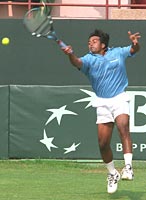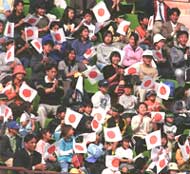India had to once again rely on their 'Miracle Man' Leander Paes to provide the healing touch in a Davis Cup tie, and the tennis star obliged with yet another sparkling performance.
Paes helped India recover and level the score 1-1 at the end of the first day in the Asia-Oceania Group I first round tie against Japan, at the R K Khanna stadium in Delhi on Friday.
 After Rohan Bopanna had gone down to Gouichi Motomura 4-6, 7-6 (7/4), 6-7 (4/7), 3-6 in the first singles rubber in the morning, Paes scored an efficient 6-3, 7-6 (7/3), 6-4 victory over Takao Suzuki in the second singles.
After Rohan Bopanna had gone down to Gouichi Motomura 4-6, 7-6 (7/4), 6-7 (4/7), 3-6 in the first singles rubber in the morning, Paes scored an efficient 6-3, 7-6 (7/3), 6-4 victory over Takao Suzuki in the second singles.
The doubles tie on Saturday will once again prove critical for the hosts who will look forward to their star combination of Paes and Mahesh Bhupathi to pull them through.
The question put forward by Japanese coach Jun Kamiwazumi at the end of the day summed up the visitors'
exasperation as well as Paes's exploits on centre court.
"Why does Paes play so well in Davis Cup? He is only ranked outside the 1000s on the ATP rankings? Is it because he eats lot of curry-rice?" asked the Japanese coach.
Paes himself could not answer the question but the flag-bearer of Indian tennis put it on the technicalities and his passion for the game while playing for the country as the motivating factor.
"It is unfortunate that I do not get to play as many singles matches as I would like. But I still enjoy playing singles although my ranking makes it difficult for me to balance between singles, doubles and playing for the country as well," Paes said.
Ironically, the ageing warrior's dismantling of Suzuki came immediately after the hopes of coming of age of young Rohan Bopanna failed to materialise. The 22-year old, playing in his first 'live' match in a Davis Cup tie, was made to realise the wide chasm between the Futures and Challenger circuitd and the higher arena.
 What made the difference today was not Bopanna's game but the sheer experience of the Japanese. With 25 Cup appearances in a career spanning ten years, Motomura always had an edge over Bopanna. And the 224-ranked Motomura made full use of it to tame the young Indian.
What made the difference today was not Bopanna's game but the sheer experience of the Japanese. With 25 Cup appearances in a career spanning ten years, Motomura always had an edge over Bopanna. And the 224-ranked Motomura made full use of it to tame the young Indian.
"I have already played Davis Cup while he (Bopanna) was playing his first. He served well but I tried to fake him by keeping moving when he was about to serve, and that unsettled him," Motomura said after the match.
Bopanna was also undone by trying to put too much on his first serve. He had 22 aces for the match but then he also committed 16 double-faults.
His erratic serve cost him dear in the seventh game of the third set when after having broken Motomura to go 4-2 up, he went on to lose serve in the next game. That brief lapse in concentration also proved to be the turning point of the match as Motomura went on to wrap up the tie-break and then the fourth set.
While Bopanna served big and fast, Motomura employed the classical method of giving the ball as much air and spin as possible to give himself time to approach the net. His approach seemed to work well in the first set when Bopanna was still overcoming the nerves of a debut match.
A foot-fault followed by a double-fault in the 10th game saw Bopanna drop serve and the set and he was still on the defensive for much of the second set when Motomura broke him to go 3-1 up. But the pendulum swung in the Indian's favour when the Japanese himself committed a double-fault to return the break in the seventh game.
Bopanna then began to chip and charge more regularly to the net, a feather touch drop shot showing his natural feel for the grass court. Into the tie-break, Bopanna took control with his attacking net play, and despite another foot-fault, went on to take the set.
He started the third set strongly, firing two aces to take the first game on love, but both the players had settled to a fine rhythm by now and games were going on serve. Then came the two crucial volley errors and a wrong line-judgment by the Indian in the seventh game that changed the course of the match.
Paes though had no such problems. If his serves were accurate and volleying was tight, Paes was also aware of Suzuki's sore shoulder, which the Japanese said he had suffered during the practice sessions.
"I had very much expected a five-set match, and was mentally prepared for all kinds of probabilities," said Paes, who had beaten Suzuki in an exciting five-set rubber when the two teams met last in Tokyo two years ago.
But that was on hard courts and under extreme cold conditions of Japan. This time Paes called the shots from the beginning. Suzuki kept pace with him, winning serve for serve, but when the score read 5-4, Paes took control of the proceedings.
The pattern was played out in almost all the three sets, except in the second, which the Japanese managed to stretch into the tie-break. There again Paes ruthlessly killed any chance his opponent might have nurtured by uncorking a 5-1 lead and then finishing it off with a couple of passing shots.
Photographs: Saab Press






